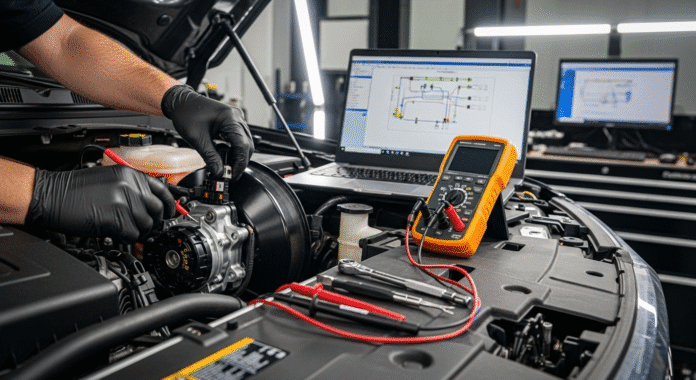Major Safety Issue Affects Popular 2025 Models Including F-150 and Bronco
Ford Motor Company’s massive recall of more than 312,000 vehicles highlights a serious safety concern that every driver should understand. The recall involves a faulty electronic brake booster module that can fail without warning, potentially leaving drivers with reduced braking power when they need it most.
This isn’t just another routine recall notice. When your brakes don’t work as expected, seconds matter, and the consequences can be devastating for you and your family.
What Makes This Recall So Serious
The electronic brake booster module serves as a critical safety component in modern vehicles. Think of it as the digital brain that helps your car stop efficiently when you press the brake pedal. This system provides the extra power assistance that makes braking smooth and predictable.
When this module fails, drivers experience what safety experts call “loss of power brake assist.” Your brakes will still work, but stopping your vehicle requires significantly more force on the pedal and takes much longer distances. Imagine trying to stop a 5,000-pound truck with the braking power of a much smaller car.
The National Highway Traffic Safety Administration (NHTSA) has identified this defect as particularly dangerous because it can occur during normal driving or when advanced driver assistance systems are engaged. These modern safety features rely on precise brake control, and a malfunctioning module can cause unexpected braking behavior.
Which Vehicles Are Affected
Ford’s recall encompasses five popular 2025 model year vehicles, spanning different production periods throughout 2024 and into 2025:
2025 Ford F-150: 217,969 units built between May 8, 2024, and June 9, 2025
2025 Ford Bronco: 39,913 units built from May 31, 2024, to June 17, 2025
2025 Ford Expedition: 26,582 units built from November 8, 2023, to June 9, 2025
2025 Ford Ranger: 20,522 units built from February 5, 2024, to June 20, 2025
2025 Lincoln Navigator: 7,104 units built from November 9, 2023, to June 9, 2025
These numbers represent a significant portion of Ford’s popular truck and SUV lineup. The F-150, America’s best-selling truck for decades, accounts for nearly 70% of the recalled vehicles.
Why Production Dates Matter More Than You Think
Here’s something many vehicle owners don’t realize: automakers don’t always assemble vehicles in Vehicle Identification Number (VIN) order. This means your 2025 model might have been built months before or after another vehicle with a similar VIN.
Ford emphasizes that owners cannot simply assume their vehicle is safe based on when they purchased it or what the VIN suggests. The only reliable way to determine if your vehicle is affected is to check directly with Ford using your specific VIN.
Understanding the Real-World Risks
The safety implications extend beyond just longer stopping distances. Modern vehicles integrate their braking systems with multiple safety features, including:
- Automatic Emergency Braking: Systems that detect potential collisions and apply brakes automatically
- Adaptive Cruise Control: Technology that maintains safe following distances
- Electronic Stability Control: Features that prevent skidding and loss of control
- Hill Start Assist: Functions that prevent rolling backward on inclines
When the brake booster module malfunctions, these safety systems may not perform as designed, creating dangerous situations where drivers expect their vehicle to respond one way but experience something entirely different.
Ford’s Response and Available Solutions
Ford has committed to fixing this issue at no cost to vehicle owners. The company plans to address the problem through software updates to the brake booster module. Depending on your vehicle’s specific configuration, this fix can be delivered in two ways:
Remote Software Update: Some vehicles can receive the fix through over-the-air updates, similar to how your smartphone receives new features. This convenient option allows Ford to repair the defect without requiring a dealership visit.
Dealership Service: Vehicles that cannot receive remote updates will need to visit an authorized Ford or Lincoln dealer for the software update. Ford has instructed dealers to prioritize these repairs to minimize inconvenience for customers.
What Vehicle Owners Should Do Immediately
If you own one of the affected Ford models, taking action quickly protects both your safety and your legal rights. Here’s your step-by-step action plan:
Step 1: Verify Your Vehicle’s Status
Contact Ford directly at 1-866-436-7332 with your VIN ready. This 17-character code, found on your dashboard near the windshield or on your driver’s side door frame, provides definitive information about whether your specific vehicle is included in the recall.
Step 2: Schedule Service if Needed
If your vehicle is affected and cannot receive a remote update, contact your local Ford or Lincoln dealer immediately to schedule the software update. Most dealers are prioritizing recall repairs to minimize wait times.
Step 3: Drive Cautiously Until Repaired
While waiting for the fix, remain extra vigilant about braking distances and avoid relying heavily on advanced driver assistance features. Allow additional stopping distance and test your brakes gently in safe conditions to understand how your vehicle responds.
Step 4: Document Everything
Keep records of all communications with Ford and any service performed. This documentation proves valuable if you experience problems or need to file insurance claims related to the defect.
Broader Implications for Vehicle Safety
This recall highlights the growing complexity of modern vehicle safety systems. Today’s cars and trucks rely heavily on electronic modules and software to manage everything from engine performance to collision avoidance.
While these technologies generally improve safety and convenience, they also create new types of failure modes that didn’t exist in purely mechanical systems. The Ford brake booster recall demonstrates how a single electronic component can affect multiple safety systems simultaneously.
Consumer advocates emphasize that this situation underscores the importance of prompt recall compliance. Unlike cosmetic defects that might be postponed, brake-related recalls demand immediate attention because the consequences of failure can be catastrophic.
Learning from Past Recalls
The automotive industry has faced similar large-scale safety recalls in recent years, from airbag defects to unintended acceleration issues. Each case teaches valuable lessons about the importance of robust testing and quality control in vehicle manufacturing.
Ford’s relatively quick identification and disclosure of this brake module defect suggests improved internal safety monitoring compared to some past industry responses. However, the large number of affected vehicles raises questions about quality assurance processes during the production phase.
Moving Forward: Your Safety Checklist
Protecting yourself and your family requires staying informed about vehicle safety issues. Consider these ongoing practices:
- Register for recall notifications through NHTSA’s website using your VIN
- Regularly check for open recalls before purchasing used vehicles
- Maintain relationships with trusted service providers who can quickly address safety issues
- Stay informed about automotive safety trends through reliable news sources
The Ford brake booster recall serves as a reminder that vehicle safety requires active participation from both manufacturers and owners. While Ford bears responsibility for designing and manufacturing safe vehicles, owners must take prompt action when safety defects are identified.
Taking Action Protects Lives
Ford’s recall of over 312,000 vehicles for brake safety defects represents a serious situation that demands immediate attention from affected vehicle owners. The potential for brake system failure, especially when interacting with advanced driver assistance systems, creates genuine safety risks that cannot be ignored.
The good news is that Ford has identified the problem and developed a solution that costs nothing for vehicle owners. The key now lies in prompt action by owners to verify their vehicle’s status and complete necessary repairs.
Don’t become a statistic in someone else’s safety study. If you own a 2025 Ford F-150, Bronco, Expedition, Ranger, or Lincoln Navigator, contact Ford today to check your vehicle’s recall status. Your family’s safety depends on it.
Have you checked your vehicle’s recall status? Share your experience in the comments below and help other readers navigate this important safety issue.




